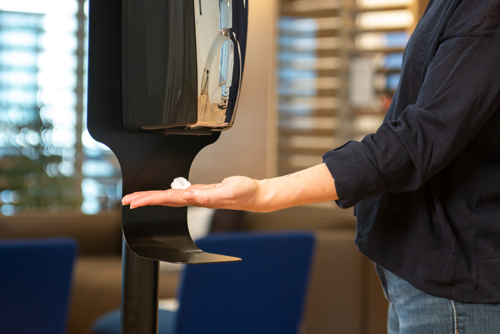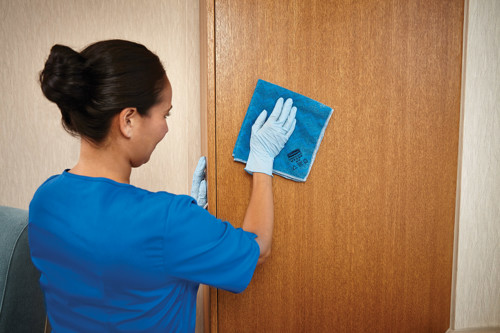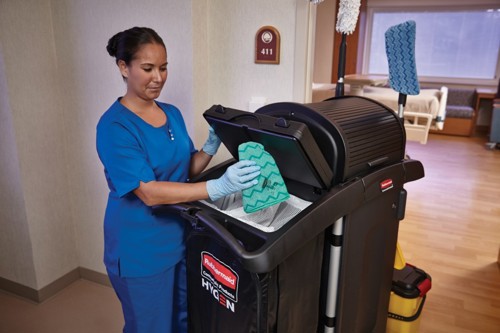
Maintaining impeccable hygiene and cleanliness in childcare centres is not just a matter of appearance — it's a critical factor in safeguarding children's and staff's health. A clean environment helps prevent the spread of germs and illnesses, ensuring that caretakers and children remain healthy and safe. This is especially important given the common challenges faced in settings where children’s natural curiosity often leads to increased exposure to potential contaminants.
Beyond health, a well-maintained childcare facility creates a positive impression on parents, reinforcing their trust in your ability to care for their children. This trust is essential for building a strong reputation in the childcare sector.
For more detailed insights on maintaining a healthy environment, you can explore our guide on infection control in childcare facilities, which covers essential strategies to manage outbreaks effectively.
Below are some practical cleaning guidelines for childcare centres to help keep your childcare facility clean, secure and enjoyable for young children.
Regulatory Standards and Compliance
In childcare centres, we must strictly adhere to regulatory standards for creating a safe and healthy environment for children. Health and safety regulations from bodies like the Australian Children’s Education and Care Quality Authority (ACECQA) and state-specific guidelines dictate precise childcare cleaning practices to minimise infection risks and promote well-being. These standards require using approved cleaning products and regular sanitation of all areas, including play zones, restrooms and dining spaces
The impact of these regulations on childcare cleaning is profound and requires rigorous routines that go beyond basic cleaning. Frequent disinfection of high-touch surfaces and regular deep cleaning are mandatory to meet these health standards. By adhering to these guidelines, childcare facilities ensure they meet legal requirements and also provide a safe environment for children and staff.
Simple Cleaning Guidelines For Childcare Centres
1. Encourage Regular Handwashing
In childcare centres, regular handwashing is a critical component of maintaining a hygienic environment. To prevent the spread of germs and illnesses, it’s important to incorporate detailed daily cleaning tasks tailored specifically for these settings. Children should be taught the importance of washing their hands at key moments, such as after using the bathroom, before and after meals, after sneezing or coughing, and after playing with toys or shared equipment. To make this routine effective, use childcare cleaning services to place sanitiser stations strategically around the facility and create a schedule that ensures all children and staff follow handwashing practices consistently.
2. Vacuum and Mop Every Day
Floors in childcare centres are hotspots for bacteria, allergens and other contaminants, making them a prime focus for daily cleaning. Given that young children spend much of their time playing on the floor, it’s essential to vacuum and mop daily to remove dirt, dust and other potential irritants. Regular vacuuming not only improves indoor air quality but also prevents mould growth and dust mite infestations. For optimal results, professional cleaning companies often recommend using HEPA-filtered vacuums and eco-friendly cleaning solutions that are safe for children.
3. Keep Wet Wipes in Every Room
In a childcare centre, spills and messes are inevitable, making it essential to have wet wipes readily available in every room. Whether it's a spilled drink, paint, bodily fluids or food splatters, wet wipes provide a quick and effective solution for immediate clean-up. They are also invaluable for child care cleaning tasks, such as wiping children's hands after activities, which is faster and more convenient than taking them to the bathroom. Keeping wet wipes in accessible locations ensures that your childcare cleaning service can respond swiftly to any mess, maintaining a clean and hygienic environment throughout the day.
4. Clean Toys Regularly
Toys in childcare centres are frequently shared, making them a common source of germ transmission. To reduce this risk, plastic toys should be washed and sterilised daily. In child care cleaning services, it's important to set aside any mouthed toys until they can be thoroughly cleaned and sanitised. For stuffed toys, deep freeze them in a plastic bag for 4-5 hours weekly to kill allergens, dust mites and germs. Regular toy cleaning helps lower the spread of germs and allergies, leading to fewer sick days and improving overall well-being in the childcare facility.
5. Choose Safe Cleaning Products
Selecting safe cleaning products is essential in childcare centres to protect young children’s health. Chemical exposure can be harmful, so it's crucial to choose products carefully. Opt for solutions using ordinary soap and water for general cleaning, and select authorised products for disinfection. Rubbermaid Hygen Microfibre products are an excellent choice, designed to reduce infection risk by effectively removing germs from surfaces. Choosing safe and effective cleaning products ensures a hygienic environment while safeguarding the children’s well-being.
6. Ensure the Correct Preparation of Food
Always ensure that surfaces and appliances used for preparing and storing food are thoroughly cleaned before use. All food should be stored at the correct temperature, and any spoiled produce must be discarded immediately. It’s crucial to discourage children from sharing meals and drinks, as this can spread germs and potentially expose children with allergies, like nut allergies, to harmful substances. Additionally, ensure that no food preparation occurs near diaper-changing areas to avoid cross-contamination.
7. Have a Cleaning Schedule at the Childcare Centre
In order to prevent or reduce the transmission of bacteria, it is critical to maintain a sanitary environment. Your childcare should really have a cleaning schedule that specifies what has to be cleaned, how often it should be cleaned and who is responsible for it. Storing everything in a cleaning cart can make finding products simpler and faster.
It's important that staff and cleaners have access to adequate cleaning detergents, microfibre cloths and mopping systems, but it's essential that all products are kept out of reach of children. If infants will be utilising toys and surfaces that have been cleaned with chemicals in the near future, caution should also be exercised over the products used. Detergents that contain sulphates, for example, can trigger asthma attacks while bleach and sodium peroxide can irritate and burn the skin and eyes.
8. Clean Nappy-Changing Areas
Keeping nappy-changing areas clean is crucial in childcare centres to prevent the transmission of germs. It is strongly advised to use diluted bleach solutions to disinfect these areas regularly. In addition to proper cleaning, basic hygiene practices are essential; staff should wash their hands thoroughly and dispose of used nappies in a safe and sanitary manner.
9. Staff Who Are Unwell Should Go Home
Preventing sick staff from coming into the childcare may appear harsh, but they pose a health risk to others, even if they don't come into close contact with other youngsters during the day. If a member of staff shows symptoms of an illness that could easily spread, such as sickness and diarrhoea, they should go home as soon as possible — the same goes for children too.
Deep Cleaning Schedules
Maintaining a regular deep cleaning schedule is crucial to ensure a healthy environment for both children and staff. While regular cleaning addresses daily hygiene needs, deep cleaning tackles areas that may not be covered in routine cleaning tasks, such as carpet cleaning, upholstery cleaning and floor cleaning. These tasks are essential for removing deeply embedded dirt, allergens and germs that accumulate over time.
The frequency of deep cleaning depends on several factors, including the level of daily use and the types of activities conducted. For example, commercial cleaning services recommend scheduling thorough cleaning sessions, including child care centre cleaning, at least once a month, with more frequent sessions in high-traffic areas. This can include tasks like disinfecting play areas, performing carpet cleaning and sanitising toys and surfaces.
Ensure a Healthier Environment with Rubbermaid Commercial Products
Following proper childcare cleaning guidelines is essential to minimise illness and maintain a safe environment for children and staff. While no centre can be entirely germ-free, adopting reliable cleaning practices and products can significantly reduce the risk of infection.
Rubbermaid Commercial Products has been a trusted provider of innovative cleaning, hygiene and waste management solutions since 1968. Our durable products are designed to save you money, protect your employees and reduce environmental impact.
For dependable cleaning solutions that help you maintain a cleaner and safer facility, contact Rubbermaid Commercial Products today. Plus, don't miss out on the opportunity to receive a free sample of our Hygen Disposable Microfibre Cloth.
Explore more by visiting Rubbermaid Commercial Cleaning Products.